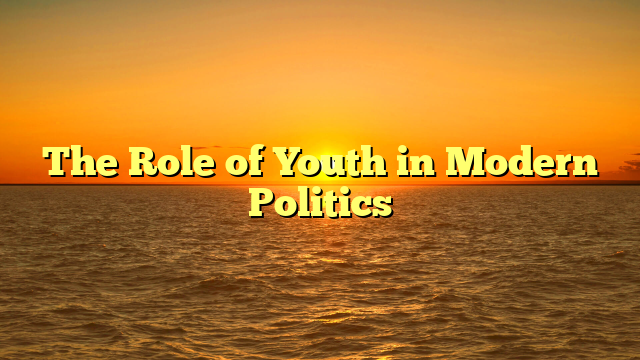In recent years, the role of youth in politics has become increasingly significant across the globe. From climate protests to voting drives and social media advocacy, young people are no longer content with simply inheriting the decisions of older generations—they are actively shaping them. This shift marks a crucial development in democratic societies, where fresh perspectives and innovative ideas are desperately needed to address persistent and emerging challenges.
Traditionally, politics has been perceived as the domain of older, more experienced individuals. This is reflected in the average age of parliamentarians and heads of state around the world, many of whom are well into their 50s or 60s. However, this status quo is being challenged by a growing number of young activists and politicians who are stepping forward to claim their seat at the table. Their engagement is not only changing the political landscape but also injecting new energy into issues long overlooked or mishandled by the establishment.
One clear example of youth influence is the global climate movement. Figures such as Greta Thunberg have captured international attention, galvanizing millions of young people to demand urgent action on climate change. Their message is clear: the consequences of today’s policies will be borne by the younger generation, and thus, they deserve a say in the decisions being made. This sense of ownership over the future is a powerful motivator, and it is driving young people to participate in protests, run for office, and hold leaders accountable.
Social media has also played a vital role in amplifying youth voices. Platforms like Twitter, Instagram, and TikTok have given rise to a new form of political activism, where information spreads rapidly and campaigns can reach millions in seconds. Young people are using these tools not just for expression but for organization and education, creating communities of politically engaged individuals who support each other’s causes and collaborate on initiatives. This digital engagement often translates into real-world impact, as seen in voter registration drives and grassroots campaigns led entirely by youth groups.
Despite situs slot qris growing involvement, young people still face significant barriers in the political arena. Many political systems are resistant to change and often dismiss youth input as naive or unrealistic. Additionally, structural obstacles such as age limits for candidacy, lack of financial resources, and insufficient mentorship programs prevent many young individuals from pursuing political careers. To overcome these challenges, governments and political parties must make deliberate efforts to include youth voices in policymaking and leadership roles.
Educational institutions also have a crucial part to play. Civic education should be prioritized in school curricula to ensure that young people understand how political systems work and how they can participate effectively. Empowering youth with knowledge and skills will help cultivate a politically literate generation ready to engage constructively rather than cynically with democratic institutions.
Ultimately, the involvement of youth in politics is not just a matter of representation—it is a matter of responsibility. The future of any nation depends on the engagement of its younger citizens, who bring not only passion and energy but also a deep concern for justice, equality, and sustainability. By supporting youth participation, societies can foster more inclusive, responsive, and forward-thinking governance.
As the challenges of the 21st century continue to evolve—from climate change to digital transformation to global inequality—the need for diverse, bold, and youthful leadership becomes ever more urgent. The time has come to view youth not merely as future leaders, but as leaders of today.
